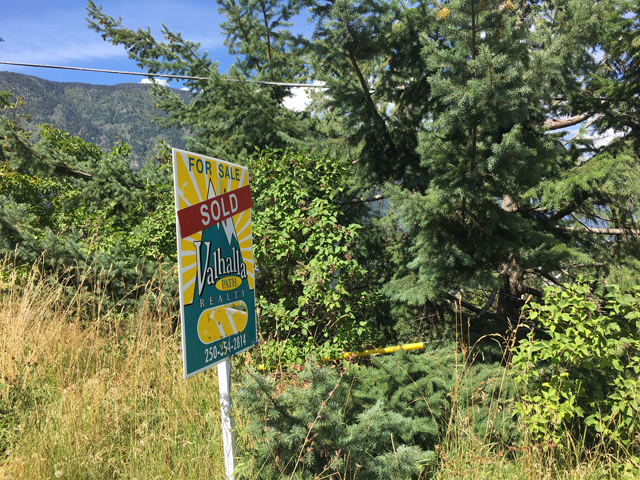Real estate market changes forthcoming as province looks to closely regulate the industry
The provincial real estate market may be swirling with change, but Nelson remains an island in the storm in face of the turbidity.
Last week the province instituted a tax on foreign ownership, increased fines for realtor misconduct and moved to create a provincial superintendent of real estate, who will take over all regulation and rule-making duties from the Real Estate Council of B.C.
The moves are in response to the ongoing public outcry for reigning in skyrocketing real estate prices in the Lower Mainland and drafting tighter controls for the industry across the province.
However, the need for control of a market gone wild in the rest of B.C. is not reflected in the market of Nelson of the present day, say some local realtors.
In fact, Valhalla Path Realty’s Robert Goertz doesn’t foresee a foreign ownership tax being implemented in Nelson, since the heritage city does not have the same issues with foreign ownership as Vancouver does.
“People are buying in Vancouver on speculation. People who own homes in Nelson use their homes, even if it is as a secondary dwelling,” he said.
No big airports and a long and winding highway keep Nelson isolated from the masses, added Goertz, who is a second generation realtor.
“It amazes me that when I am in Vancouver or other large centres that more people aren’t seeking out the lifestyle that our area offers,” he said. “But as beautiful as Nelson and the Kootenays are, the trend is towards higher density urban living, not rural living.”
But Century 21 realtor Brian Euerby said a foreign ownership tax may come to pass in Nelson, even though the tax was largely targeted toward those from mainland China that are making offers without seeing the properties.
“The demographic of the (buyers) would suggest they prefer the larger urban lifestyles,” he said about Nelson. “That said, though, this model is being watched carefully by other levels of government and there has been some discussion that this tax may well spread throughout the entire province if foreign ownership spreads to the Interior.”
In the 25 years he has been selling real estate in Nelson, Euerby has seen very little foreign ownership in the model of foreign buyers clustering purchases without looking at the home first and paying whatever it takes to get it done.
“With that, we are experiencing a smaller percentage rise in prices, inventory levels are lower and the demand is high,” he said about the Nelson market. “The high demand may well be as a spin off result of the foreign ownership and the continued flurry of activity occurring on the Lower Mainland.”
The debate about the Lower Mainland’s housing market has focused on the notion that wealthy foreign buyers are driving up prices and then leaving homes and condominiums empty.
Preliminary results of the province’s research tracking the nationality of home buyers are indicating foreigners — people who aren’t Canadian citizens or permanent residents — account for 10 per cent of buyers in the Vancouver region, up to 18 per cent in Burnaby and Richmond.
Foreign buyers have also accounted for over $1 billion in homes purchased across the province
As a result, since Aug. 2 the province has instituted a 15 per cent tax on sales involving buyers who aren’t Canadian citizens or permanent residents. Beginning Aug. 2, the one-time tax applies to foreign buyers; foreign-registered corporations; or Canadian corporations controlled in whole or in part by foreign nationals or foreign corporations.
In addition, the province could allow the City of Vancouver to impose a tax on vacant homes, with a city-led study finding over 10,800 empty homes in the city in 2014. The province could allow other cities to implement similar taxes.
“You would be surprised as to how many vacant homes there are out there, but none of which I would suggest are as a result of the foreign buyers that are being targeted on the Lower Mainland,” Euerby said.
And the Nelson market is not fraught with the same problems and challenges as the Lower Mainland, Euerby explained. When he got into the business in the early 1990’s, there was a good push of the market until May of 1994.
From there the market flat lined, he noted, with prices softening until November of 2002. There was a good steady rise in prices in Nelson until 2008 when the credit crunch surfaced. From 2008 to about the second quarter of 2015 there was another flatline with prices softening, Euerby explained.
“People need a place to live and rising prices are the reality they are faced with even if it means over extending themselves,” Euerby said. “I personally believe people are over extending themselves to reach up for prices. Any rise in the interest rates and this is going to tip many over the edge, a society that is already statistically spend $1.60 for every $1 earned.”
And a good deal of the $1.60 is simply debt service, he said.
“If this tax, and it is substantial, spreads nationwide, it will have an impact,” he said. “Two things are driving this market: foreign investment in larger urban centres; and low interest rates. If one or the other of those is taken out of the equation then Houston, we have a problem. If both change, well … stay tuned.”
The basis for a healthy vibrant real estate market should be driven by, in turn, a healthy vibrant economy, not because of out-of-control prices rising fueled by foreign ownership said Euerby.
“There has been a slow and steady decline in retail sales (we are over extended and servicing debt), thus a slow and steady decline in the Chinese economy (where most of our goods are produced that we are no longer buying), which will eventually dry up that foreign money arriving,” he said.
“Nelson and area has certainly lost its share of middle income earners over the years, the sector of the population that are proven to be the backbone of any healthy economy. In the meantime, we in real estate often kibitz Nelson’s number one industry is quality of life, and there is no denying that.”
The province is also planning to create a dedicated superintendent of real estate, who will take over all regulation and rule-making duties from the Real Estate Council of B.C. — a self-regulating body that is largely controlled by realtors.
In turn, the council will be restructured to ensure the majority of members come from outside the real estate industry.
Stricter rules for the real estate will also come into effect:
- higher fines of $250,000 for agents, up from $10,000, and $500,000 for brokerages;
- real estate agents who engage in misconduct will have to return commissions to victims;
- and dual agency will come to an end, in which a single real estate agent represents both the buyer and the seller.
Goertz didn’t see the changes to the powers of the Real Estate Council as a comment on the quality of most realtors.
“Like in any profession, there is a small minority of people that do not conduct themselves with their client’s best interest in mind,” he said. “The majority of realtors are working hard for their clients to help them make what for many is the largest single investment that they will make in their lives.”
Goertz said the new rules will help create an environment in which the unethical are punished and, therefore, making it easier for the ethical realtor to provide quality service.
And, despite the changes, there will not be a ripple effect in Nelson.
“I don’t expect these new rules to have any effect on the local real estate market and welcome the changes,” said Goertz.
The ending of dual agency — agents representing both buyer and seller at the same time — and stricter fines for people violating the real estate rules province-wide will not affect the local market, Euerby felt.
“I am not aware of any realtors in our area being scrutinized for misbehaviour to their ethics and standards,” he said. “No rise or fall of the market will occur due to a realtor having to excuse themselves from the involvement of dual agency.”
Other recommendations from the provincial panel examining the real estate industry included:
- the council should create confidential reporting tools to encourage the public and whistle blowers from within the industry to come forward with complaints;
- real estate agents should not be permitted to keep the proceeds from unscrupulous deals, which should instead be returned to victims;
- all offers on a listed property should be filed with the agent’s managing broker and retained to allow the real estate council to review them;
- real estate agents should not be permitted to acquire an interest in their own listings;
- managing brokers and agents will be required to report misconduct to the council;
- consumers should be given more information about the obligations owed to them by their real estate agent;
- real estate agents should be subject to a new code of ethics and professional conduct.
Source: Globe and Mail

























